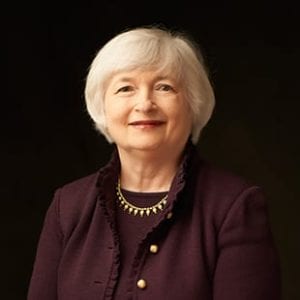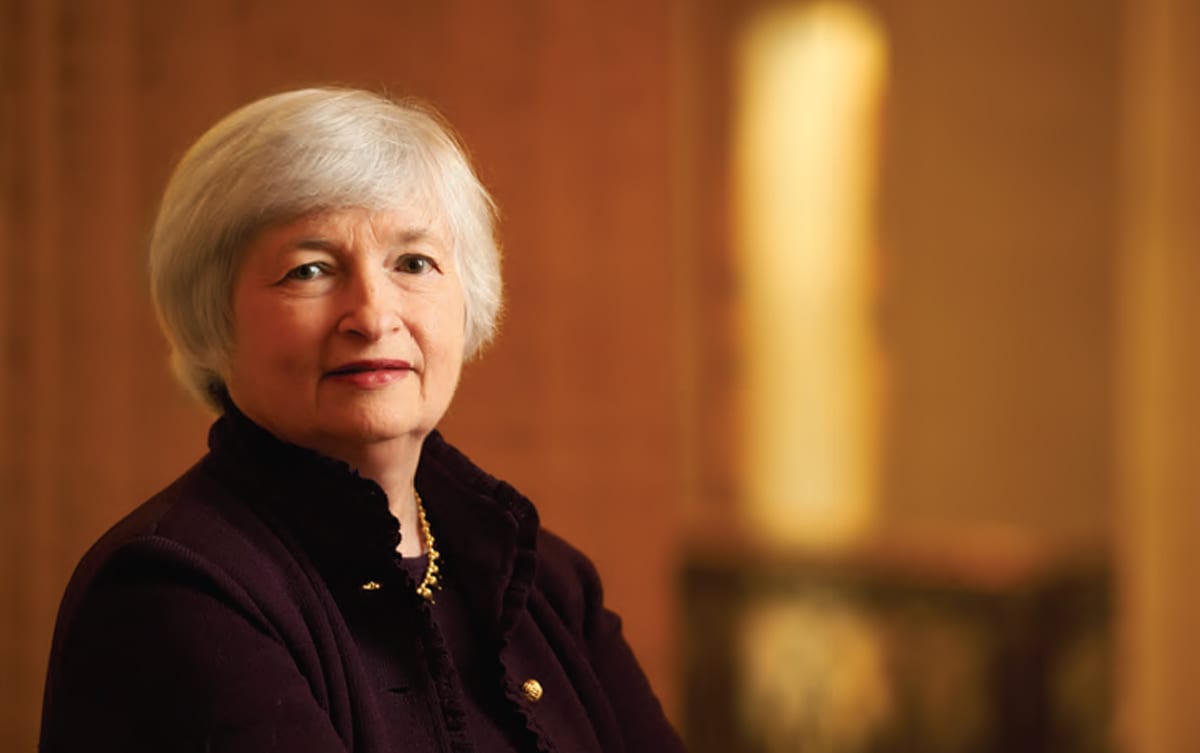Will AI replace marketing managers? Q&A with Professor Zsolt Katona
Updated Nov. 30
Berkeley Haas Professor Emeritus Janet Yellen, the first woman to have led the Federal Reserve, is expected to take on another trailblazing role as President-elect Joseph Biden’s Treasury secretary.
Yellen, who taught economics to thousands of undergraduate and graduate students during her 26 years as an active Berkeley Haas faculty member, would be the first woman to lead the Treasury Department. If confirmed, she will be the new president’s lead economic advisor as he confronts the fallout from the coronavirus pandemic and lockdown.
“As a brilliant economist with great personal humility and empathy for the people behind the statistics, Janet Yellen embodies the best of Haas and UC Berkeley,” said Dean Ann Harrison. “We are proud and excited to hear the news that she will be the new president’s top economic advisor at this very difficult time for the country. She also carries on a proud tradition of Berkeley women in economic leadership roles. Our country will be in excellent hands.”
[Janet Yellen] carries on a proud tradition of Berkeley women in economic leadership roles. —Dean Ann Harrison
Yellen is one of several female UC Berkeley economics professors to have shattered the glass ceiling in the male-dominated field, at the highest ranks of government. Former Berkeley Haas Dean Laura Tyson, distinguished professor of the graduate school, was the first woman to chair the President’s Council of Economic Advisers (CEA) and the National Economic Council, both during the Clinton administration. Tyson led the effort to nominate Yellen to her first high-level government position on the Federal Reserve Board of Governors. Berkeley Economics Professor Christina Romer also chaired the CEA for four years in the Obama administration. (Berkeley economics PhD alumna Lisa Cook, a professor at Michigan State University, has been named to Biden’s Federal Reserve transition team.)
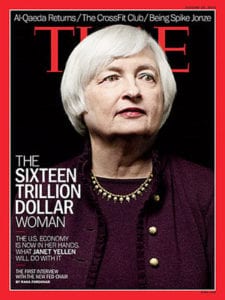
Time Magazine cover, January 2014
Yellen was appointed by former President Barack Obama in 2014 to chair the Fed’s Board of Governors, serving in what has been called the world’s most powerful economic job until 2018. She was praised for achieving “near perfection” during her tenure, steering the central bank with steadfast pragmatism in a slow series of interest rate increases. Unemployment fell from 6.7% to 4.1%, inflation stayed low, and the economy built up a head of steam. Her policies are credited with helping to drive unemployment to its lowest level in 50 years before the coronavirus hit.
With the pandemic now raging, Yellen—who, since leaving the Fed, has been in residence as a distinguished fellow at the Brookings Institution and has worked on California Gov. Gavin Newsom’s Task Force on Jobs and Competitiveness—will be walking back into a situation that’s very different from what she left just two years ago. Prof. Jim Wilcox, who knew Yellen as a faculty member and also served as a senior economist with the Federal Reserve and the President’s Council of Economic Advisors, said she will have some important advantages.
“First, the new administration could hardly find someone who’s had more experience in Washington policy-making over the past couple of decades. She’s been around, and she’s earned the respect of folks widely in policy circles, not to mention academic circles and financial markets, which will help a lot,” Wilcox said. “One of the advantages the new administration has is we now have a lot more data on what works and what doesn’t, and I have no doubt she’s been thinking long and hard about this ever since we learned to spell COVID. What you’re likely to see is a much sharper, more finely honed set of policies.”
I have no doubt she’s been thinking long and hard about this ever since we learned to spell COVID. What you’re likely to see is a much sharper, more finely honed set of policies. —Prof. Jim Wilcox
Tyson, who was actively involved in recruiting Yellen and her husband, Prof. Emeritus George Akerlof, to Berkeley and has remained a close colleague and friend, recently worked with Yellen and Berkeley Haas Assoc. Prof. Adair Morse to develop an innovative small business loan program, the California Rebuilding Fund, launched last week. “One of her goals as Treasury Secretary will be to increase federal funding for small businesses that have been hit disproportionately hard by the pandemic,” Tyson said.
Yellen served as the Fed’s vice chair from 2010 to 2014, in the wake of the financial crisis, and was president and chief executive officer of the Federal Reserve Bank in San Francisco from 2004 to 2010. She chaired the President’s Council of Economic Advisers from 1997 to 1999 during the Clinton administration. She will become the first person to have served as Fed chair, chair of the Council of Economic Advisors, and Treasury Secretary, if confirmed.
Born in Brooklyn in 1946, Yellen studied economics at Brown University and earned her PhD at Yale University. She studied with economist Joseph Stiglitz, who later shared the 2001 Nobel Prize in economics with Yellen’s husband, Akerlof, and Michael Spence of Stanford University.
After starting her academic career as an assistant professor at Harvard University and a brief early stint as a Federal Reserve economist, Yellen joined the Berkeley Haas faculty in 1980, also holding an appointment in the economics department from 1999 to 2003. For the next 26 years, she taught thousands of MBA and undergraduate students in the required macroeconomics course, as well as graduate courses in economics and trade. Her academic research focuses on unemployment and labor markets, monetary and fiscal policies, and international trade. Beloved by her students, she earned the school’s highest teaching honor, the Earl F. Cheit Award for Excellence in Teaching, in 1985 and 1988. She now holds the title of Eugene E. and Catherine M. Trefethen Professor Emeritus of Business Administration. She was named as a Distinguished Fellow by the American Economic Association in 2012.
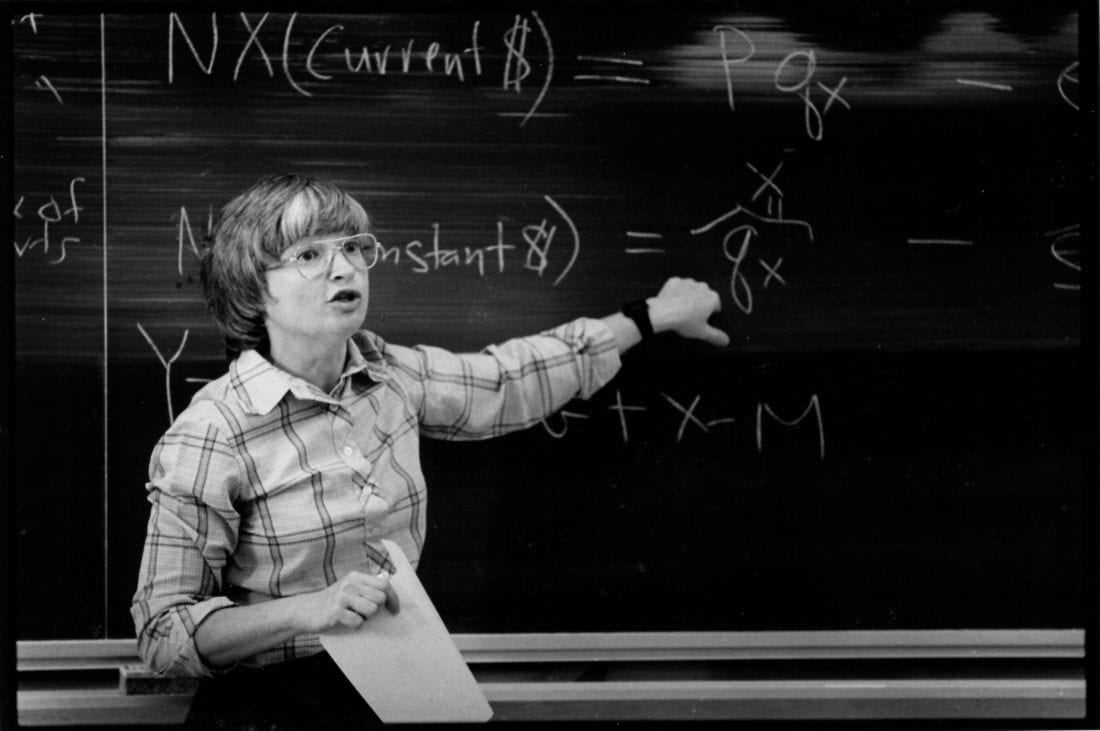
Prof. Janet Yellen teaching at Berkeley Haas, year unknown. (Photo: Bruce Cook)
Berkeley Haas Finance Prof. Ulrike Malmendier said it was Akerlof, and to a lesser extent Yellen, who recruited her to Berkeley in 2012, taking the time to convince her that it was the best place for her. “They both started out as purist researchers who asked unusual questions, and she has never lost the researcher’s mind of curiosity,” said Malmendier, who won the prestigious Fischer Black Prize for her behavioral economics research in 2013. “They are also a wonderfully sweet and loving couple, who always take the time to ask about what you’re working on, in a world where not everyone is that way.”
Malmendier said Yellen’s manner and resilience stood out in the male-dominated field. “Some people become more brusque to move ahead, but she never let herself be molded. She kept caring about what she wants to care about, as a brilliant woman who can combine research and policy at the highest level.” Yellen’s style is reminiscent of how Socrates is described, Malmendier said. “Rather than always assert her position, she just keeps asking questions, with a humble persistence. And eventually you realize maybe you weren’t right.”
Malmendier said one of her neighbors recently noticed Yellen perusing the produce aisle at North Berkeley’s Monterey Market. When she approached her and said, “You’re Janet Yellen! What are you doing here?,” Yellen smiled and replied “Well, I would never miss the tomato season at Monterey Market.”
Former Berkeley Haas Dean Rich Lyons, who is now chief innovation and entrepreneurship officer for UC Berkeley, said Yellen embodies the culture that he codified at Haas. “It is hard for me to think of a better exemplar of the Haas School’s four defining leadership principles than Janet Yellen. Confidence without attitude? To a T. Question the status quo? She is constantly seeking better ways. Beyond yourself? If you know her, you know this is her. Students always? A more honest thinker would be hard to find.”
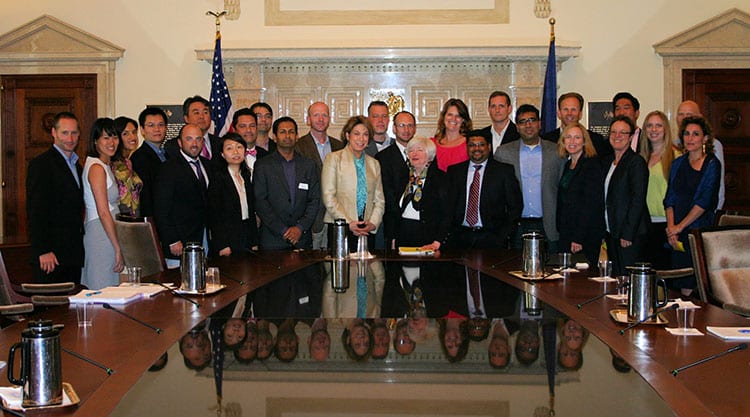
Executive MBA students meet with Janet Yellen and Laura Tyson during a Washington, D.C. immersion week in 2015.
Related stories:
Janet Yellen leaves the Fed after achieving “near perfection”
Posted in:
Topics:
